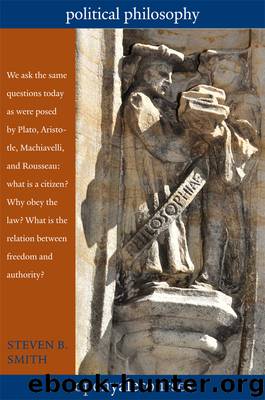Political Philosophy by Steven B. Smith

Author:Steven B. Smith
Language: eng
Format: epub
Publisher: Yale University Press
Hobbes’s New Political Science
Hobbes was intensely aware of himself as an innovator. Like Machiavelli, who claimed that he was the first to examine the “effectual truth” of things, Hobbes once boasted that “civil science is no older than my De Cive.”2 What, precisely, did Hobbes regard as so novel about his approach?
Hobbes saw himself as the founder of a new political science modeled along the lines of other early founders of the scientific revolution—Galileo, Harvey, and Descartes. Like these other revolutionaries, who overthrew the older Aristotelian paradigm in natural science, Hobbes set out to undermine Aristotle’s authority in political science. He set himself up as the great anti-Aristotle. Consider the following passage from a chapter entitled “Of Darkness from Vain Philosophy and Fabulous Traditions”: “There is nothing so absurd that the old philosophers … have not some of them maintained. And I believe that scarce anything can be more absurdly said in natural philosophy than that which now is called Aristotle’s Metaphysics; nor more repugnant to government than much of that he hath said in his Politics; nor more ignorantly than a great part of his Ethics” (XLVI, 11). What was it, exactly, that Hobbes claimed to find so absurd, repugnant, and ignorant?
Hobbes is especially concerned with the foundations or building blocks of his new science. He was very self-conscious about what today would be called “methodology.” Aristotle started by stressing the limits of political knowledge. The subject matter of politics—human actions—allows of such variety and irregularity that we cannot expect the kind of strict knowledge that one might find in the natural or the mathematical sciences. In politics and ethics, Aristotle wrote, we must not ask for more certainty than the subject allows. It would be just as foolish to accept arguments of probability from a mathematician as to demand strict demonstrations from a rhetorician. He even suggests it is a sign of immaturity to demand great precision in matters political and ethical. Whatever general rules can be derived from politics will only be true provisionally or for the most part. Hobbes’s approach begins almost literally with taking Aristotle to task. The failure of Aristotle’s Politics and Ethics was a failure of methodology. Rather than remaining wedded to ordinary opinions—the endoxa—as did Aristotle, Hobbes will dissolve opinion—deconstruct it, in our terms—to derive a method that will guarantee strict theoretical knowledge.
The opening chapters of Leviathan present a kind of political physics where human beings are reduced to the body and the body is further reduced to so much matter in motion. Human beings can be reduced to their moveable parts, much like a machine. What is life, he asks rhetorically in the Introduction, but a motion of the limbs? What is the heart but a spring, and what is reason but a means of calculating pleasures and pains? Hobbes sets out to give a deliberately and thoroughly materialistic and nonteleological physics of human nature. A French disciple of Hobbes in the next century, a man named La Mettrie, wrote a book entitled L’homme machine: man, a machine.
Download
This site does not store any files on its server. We only index and link to content provided by other sites. Please contact the content providers to delete copyright contents if any and email us, we'll remove relevant links or contents immediately.
The Secret History by Donna Tartt(16723)
The Social Justice Warrior Handbook by Lisa De Pasquale(11506)
Thirteen Reasons Why by Jay Asher(7833)
This Is How You Lose Her by Junot Diaz(5829)
Weapons of Math Destruction by Cathy O'Neil(5080)
Zero to One by Peter Thiel(4867)
The Myth of the Strong Leader by Archie Brown(4809)
Promise Me, Dad by Joe Biden(4478)
Beartown by Fredrik Backman(4465)
How Democracies Die by Steven Levitsky & Daniel Ziblatt(4448)
Stone's Rules by Roger Stone(4438)
The Fire Next Time by James Baldwin(4373)
100 Deadly Skills by Clint Emerson(4108)
A Higher Loyalty: Truth, Lies, and Leadership by James Comey(4059)
Rise and Kill First by Ronen Bergman(4045)
The David Icke Guide to the Global Conspiracy (and how to end it) by David Icke(3913)
The Farm by Tom Rob Smith(3895)
Secrecy World by Jake Bernstein(3808)
The Doomsday Machine by Daniel Ellsberg(3758)
